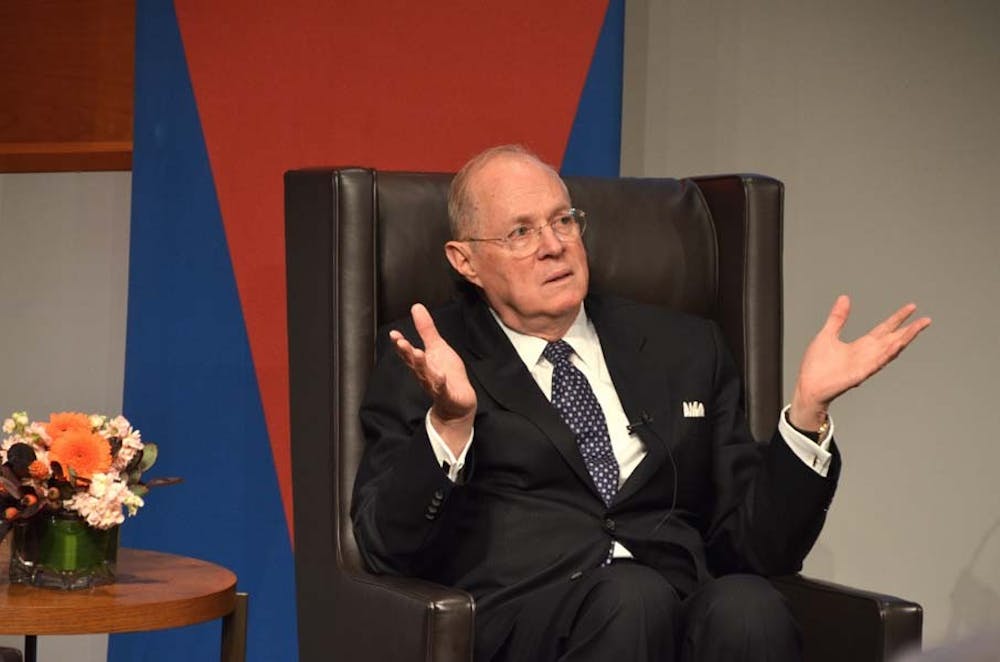
Supreme Court Justice Anthony Kennedy dazzled alumni, faculty and staff of Penn Law School with his intellect and “personable” demeanor at a lecture on Thursday night as he discussed the role of the courts in American society.
His lecture was part of a three-day visit, which inaugurated Penn Law’s Visiting Jurist Program.
During his lecture and conversation with Penn Law Dean Michael A. Fitts, followed by his subsequent question and answer session with the audience, Kennedy touched upon many topics in law, including legal ethics, the role of the courts and current challenges facing the legal profession.
“It is the language of the law that unites us with a common purpose,” Kennedy said in his introductory remarks, distinguishing law from politics and common discourse.
Law has “an elegance, a constraint, an ethic, a grammar,” he said.
On the topic of ethics, Kennedy touched upon the distinction between professional responsibility and legal ethics, noting that the latter term “ensures there is a right or a wrong.”
In one example, Kennedy drew upon his experience in private practice in a case where he was representing a husband who wanted him to ask for custody in a divorce proceeding in order to improve his standing with regards to the settlement.
He said no to that strategy, Kennedy said, event though he knew other lawyers would have said yes.
“I just think that you shouldn’t do certain things,” he explained.
Kennedy, who started his three-day visit to Penn Law on Oct. 2, also talked about the use of cameras in the courtroom in reference to a question that a Penn student had asked him the other day.
Although cameras are currently not allowed in the Supreme Court when decisions are rendered, he acknowledged that there were many positive arguments for allowing them in, such as exposing the public to the Court. However, he said that he still believes in the no-camera rule.
“My position is that we should not have the cameras in the courtroom because we teach by keeping them out,” Kennedy said.
Kennedy, who continually referred to the Court’s role as a teacher in American society, said that most of its teaching is done through written decisions, and that putting the spotlight on the Court could change its members’ behavior — or at least make it seem like some justices are asking the “snappy,” rather than important, questions.
But Kennedy also noted that despite the Court’s ability to render justice for injured parties, it is not the supreme caretaker of the country.
“Any society which relies on nine unelected judges to solve [all the most pressing problems] is not a democratic society,” he said.
Related: Ashton Kutcher event rescheduled for Oct. 7
One of the final topics Kennedy addressed on Thursday night was the nature of how the Supreme Court changes its position over time.
In his response, which was prompted by a question from an audience member about the Court’s changing stance on same-sex marriage, Kennedy explained that it was time itself — in addition to the legal community — which played a large role in altering the Court’s view on certain issues.
“The nature of injustice is that you can’t see it in your own time,” he said.
This notion resonated with 1973 College of Women graduate Robin Lincoln, who attended Kennedy’s lecture with her husband, who was a Penn Law graduate.
“Now it seems so archaic, but at the time it seemed normal” to have a College of Women, Lincoln said.
“Forty years ago, nobody thought about it,” she added. “We felt the College of Women at Penn was enlightened” since other schools were just getting around to accepting women.
Lincoln also noted that she enjoyed the way Kennedy argued his points.
“The level of discourse is so much higher and it reminded me of what the level of solid discourse in this country used to sound like,” she said. “I wished that it could be like that today.”
Related: Penn law graduates see exceptionally high employment rates
Due to an editing error, the caption below the photo misidentified Justice Anthony Kennedy as Justice Andrew Kennedy. The DP regrets the error.
The Daily Pennsylvanian is an independent, student-run newspaper. Please consider making a donation to support the coverage that shapes the University. Your generosity ensures a future of strong journalism at Penn.
DonatePlease note All comments are eligible for publication in The Daily Pennsylvanian.




